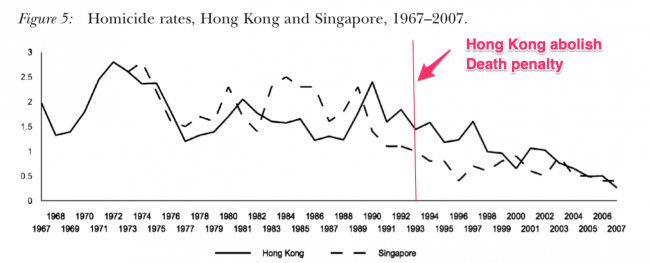Back in mid October 2018, Malaysia’s de-facto Law Minister Liew Vui Keong had announced that the newly elected Malaysian government planned to abolish the death penalty which was currently employed by its legal system as punishment for severe crimes such as murder, illegal firearms possessions, drug trafficking etc. With that one rather controversial statement, the issue of death penalty was once again back under intense spotlight , especially in south east Asia.
Prior to 2018, neighbours Malaysia along with Indonesia shared Singapore’s firm stance on the use of the death penalty as a necessity tool in deterring heinous crimes. President Joko Widodo of Indonesia would not budge when pressed for a stay of execution by the Australian government for the famous Bali nine drug smugglers back in 2015. Against worldwide objections Indonesia went ahead with the execution of the Australian drug smugglers.
Worldwide condemnation descended on Indonesia as Australia cried foul over the execution of nine of its citizens by a firing squad. Application of the death penalty on foreign nationals has always been controversial and Singapore knows this very well indeed. Since 1991, more than 400 prisoners have been executed in Singapore and a significant number of those prisoners were foreigners. International attention on the number of executed prisoners is great due to Singapore’s small population of only 5.6 million. Thus Singapore would always be on the radar whenever the issue of death penalty is brought up.
Amnesty International has always opposed the use of the death penalty worldwide without exception. It believes that the death penalty is an act of revenge rather than a means of achieving justice for victims of crimes. Scientific studies have not been able to prove that the death penalty is effective in curbing heavy crimes such as murder, drug trafficking, robbery etc. In fact criminologists have long argued that the best way to deter crimes is to increase the certainty of detection, arrest and conviction.
Hong Kong would be a very good and clear example as to how the abolishment of the death penalty has not resulted in an increased crime rate.
In a finding by a study in the Journal of Empirical Legal Studies dated March 2010, Hong Kong and Singapore were used as sample cases due to the two city states’ similarities.
The death penalty was legally abolished by the Hong Kong government in 1993 but it must be noted that the last time Hong Kong had carried out an execution was all the way back in 1966.
The study had found that the homicide levels and trend in Hong Kong and Singapore were “remarkably” similar with the former having ceased meting out the death penalty in the mid 60s.

While Hong Kong may attribute its low murder rate due to efficient and professional police work, Singapore stands firm on the belief that issue of the death penalty is not about human rights but rather its prerogative to use in curbing crime, especially drug trafficking in its island republic.
Despite the government’s insistence on maintaining the death penalty, drug-related crimes remain high. The European Institute For Crime Prevention And Control puts Singapore’s drug-related crimes as being worse than countries such as Costa Rica and Turkey in 2010. This was in line with the Central Narcotics Bureau’s (CNB) report of record-high drug seizures in 2012. The total drug haul was a 14% increase than 2011 and just last year in 2017, CNB had managed to cripple a staggering 23 drug syndicates. The statistics somewhat proved that stricter law enforcement, even in the form of the death penalty did not seem to have any bearing on curbing a heinous crime such as drug trafficking.
Human rights proponents have long argued that in drug-related offences, it is almost always the drug mules who are caught and sent to the courts to await conviction. The true masterminds of the drug trade are harder to track and arrest. And so it appears that the death penalty unfairly punishes those who were forced into the drug trade due to a harsh socio-economic background.
According to the Central Narcotics Bureau back in February 2018, close to two thirds of new drug abusers were aged under 30. This signals a very worrying trend despite the harsh laws that are in place and strongly calls for active discussions, studies and efforts into understanding the reasons youngsters resort to drug abuse. Factors such as lack or absence of education, poor economic background, weak family units and unconducive living environment may all contribute to this national drug problem.
As Malaysia joins 106 other countries in permanently doing away with this form of punishment most of the world deem as barbaric and ineffective in preventing crimes, Singapore will continue to practice it as part of its justice system. It is an Asean policy to respect and not interfere in the governing of its member states so Singapore would not be facing any objections from its South-east Asian allies at least. It will, however, be subjected to the same arguments and undue attention so long as the world moves towards the total abolishment of the death penalty.
“Singapore recognizes that the death penalty is a severe penalty and cannot be remedied in the event of any mistake in its application. That is why we have used it sparingly and only for the most heinous crimes.”
Letter dated 27 October 1999 from the Permanent Representative of Singapore to the United Nations, addressed to the President of the General Assembly, UN reference: A/C.3/54/5
“…the right to life is not the only right, and […] it is the duty of societies and governments to decide how to balance competing rights against each other.” (12)”
Letter addressed to the UN Special Rapporteur on extrajudicial, summary or arbitrary executions and circulated in 2001 at the 57th session of the Commission on Human Rights by the Permanent Representative of the Republic of Singapore to the UN.


